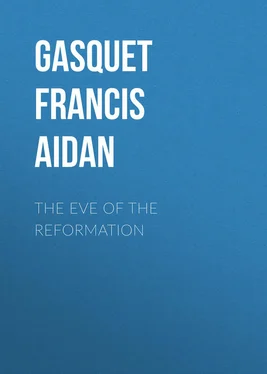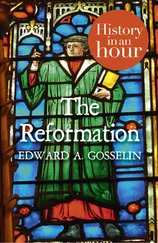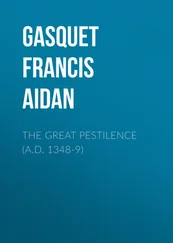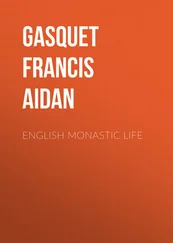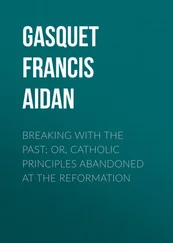Francis Gasquet - The Eve of the Reformation
Здесь есть возможность читать онлайн «Francis Gasquet - The Eve of the Reformation» — ознакомительный отрывок электронной книги совершенно бесплатно, а после прочтения отрывка купить полную версию. В некоторых случаях можно слушать аудио, скачать через торрент в формате fb2 и присутствует краткое содержание. Жанр: foreign_antique, foreign_prose, на английском языке. Описание произведения, (предисловие) а так же отзывы посетителей доступны на портале библиотеки ЛибКат.
- Название:The Eve of the Reformation
- Автор:
- Жанр:
- Год:неизвестен
- ISBN:нет данных
- Рейтинг книги:3 / 5. Голосов: 1
-
Избранное:Добавить в избранное
- Отзывы:
-
Ваша оценка:
- 60
- 1
- 2
- 3
- 4
- 5
The Eve of the Reformation: краткое содержание, описание и аннотация
Предлагаем к чтению аннотацию, описание, краткое содержание или предисловие (зависит от того, что написал сам автор книги «The Eve of the Reformation»). Если вы не нашли необходимую информацию о книге — напишите в комментариях, мы постараемся отыскать её.
The Eve of the Reformation — читать онлайн ознакомительный отрывок
Ниже представлен текст книги, разбитый по страницам. Система сохранения места последней прочитанной страницы, позволяет с удобством читать онлайн бесплатно книгу «The Eve of the Reformation», без необходимости каждый раз заново искать на чём Вы остановились. Поставьте закладку, и сможете в любой момент перейти на страницу, на которой закончили чтение.
Интервал:
Закладка:
The preacher then goes on to condemn the coarse style of preaching against the Pope in which some indulged at that time. “I would exhort,” he says, “such as are of my sort and use preaching, so to temper their words that they be not noted to speak of stomach and rather to prate than preach. Nor would I have the defenders of the king’s matters rage and rail, or scold, as many are thought to do, calling the Bishop of Rome the ‘harlot of Babylon’ or ‘the beast of Rome,’ with many such other, as I have heard some say; these be meeter to preach at Paul’s Wharf than at Paul’s Cross.” 106 106 Simon Matthew, Sermon made in the Cathedrall Church of Saynt-Paule, 27 June 1535 (Berthelet, 1535).
The care that was taken at this time in sermons to the people to decry the Pope’s authority, as well as the abuse which was hurled at his office, is in reality ample proof of the popular belief in his supremacy, which it was necessary to eradicate from the hearts of the English people. Few, probably, would have been able to state the reason for their belief; but that the spiritual headship was fully and generally accepted as a fact is, in view of the works of the period, not open to question. Had there been disbelief, or even doubt, as to the matter, some evidence of this would be forthcoming in the years that preceded the final overthrow of Papal jurisdiction in England.
Nor are direct declarations of the faith of the English Church wanting. To the evidence already adduced, a sermon preached by Bishop Longland in 1527, before the archbishops and bishops of England in synod at Westminster, may be added. The discourse is directed against the errors of Luther and the social evils to which his teaching had led in Germany. The English bishops, Bishop Longland declares, are determined to do all in their power to preserve the English Church from this evil teaching, and he exhorts all to pray that God will not allow the universal and chief Church – the Roman Church – to be further afflicted, that He will restore liberty to the most Holy Father and high-priest now impiously imprisoned, and in a lamentable state; that He Himself will protect the Church’s freedom threatened by a multitude of evil men, and through the pious prayers of His people will free it and restore its most Holy Father. Just as the early Christians prayed when Peter was in prison, so ought all to pray in these days of affliction. “Shall we not,” he cries, “mourn for the evil life of the chief Church (of Christendom)? Shall we not beseech God for the liberation of the primate and chief ruler of the Church? Let us pray then; let us pray that through our prayers we may be heard. Let us implore freedom for our mother, the Catholic Church, and the liberty, so necessary for the Christian religion, of our chief Father on earth – the Pope.” 107 107 Joannis Longlondi Tres conciones (R. Pynson), f. 45.
Again, Dr. John Clark, the English ambassador in Rome, when presenting Henry’s book against Luther to Leo X. in public consistory, said that the English king had taken up the defence of the Church because in attacking the Pope the German reformer had tried to subvert the order established by God Himself. In the Babylonian Captivity of the Church he had given to the world a book “most pernicious to mankind,” and before presenting Henry’s reply, he begged to be allowed to protest “the devotion and veneration of the king towards the Pope and his most Holy See.” Luther had declared war “not only against your Holiness but also against your office; against the ecclesiastical hierarchy, against this See, and against that Rock established by God Himself.” England, the speaker continued, “has never been behind other nations in the worship of God and the Christian faith, and in obedience to the Roman Church.” Hence “no nation” detests more cordially “this monster (Luther) and the heresies broached by him.” For he has declared war “not only against your Holiness but against your office; against the ecclesiastical hierarchy, against this See, that Rock established by God Himself.” 108 108 Assertion of the Seven Sacraments against Luther (translation by J. W., 1687), f. a. i.
Whilst the evidence goes to show the full acceptance by the English people of the Pope’s spiritual headship of the Church, it is also true that the system elaborated by the ecclesiastical lawyers in the later Middle Ages, dealing, as it did, so largely with temporal matters, property, and the rights attaching thereto, opened the door to causes of disagreement between Rome and England, and at times open complaints and criticism of the exercise of Roman authority in England made themselves heard. This is true of all periods of English history. Since these disagreements are obviously altogether connected with the question, not of spirituals, but of temporals, they would not require any more special notice but for the misunderstandings they have given rise to in regard to the general attitude of men’s minds to Rome and Papal authority on the eve of the Reformation. It is easy to find evidence of this. As early as 1517, a work bearing on this question appeared in England. It was a translation of several tracts that had been published abroad on the debated matter of Constantine’s donation to the Pope, and it was issued from the press of Thomas Godfray in a well-printed folio. After a translation of the Latin version of a Greek manuscript of Constantine’s gift, which had been found in the Papal library by Bartolomeo Pincern, and published by order of Pope Julius II., there is given in this volume the critical examination of this gift by Laurence Valla, the opinion of Nicholas of Cusa, written for the Council of Basle, and that of St. Antoninus, Archbishop of Florence. The interest of the volume for the present purpose chiefly consists in the fact of the publication in England at this date of the views expressed by Laurence Valla. Valla had been a canon of the Lateran and an eminent scholar, who was employed by Pope Nicholas V. to translate Thucydides and Herodotus. His outspoken words got him into difficulties with the Roman curia, and obliged him to retire to Naples, where he died in 1457. The tract was edited with a preface by the leader of the reform party in Germany, Ulrich von Hutten. In this introduction von Hutten says that by the publication of Pincern’s translation of the supposed donation of Constantine Julius II. had “provoked and stirred up men to war and battle,” and further, he blames the Pontiff because he would not permit Valla’s work against the genuineness of the gift to be published. With the accession of Leo X. von Hutten looked, he declares, for better days, since “by striking as it were a cymbal of peace the Pope has raised up the hearts and minds of all Christian people.” Before this time the truth could not be spoken. Popes looked “to pluck the riches and goods of all men to their own selves,” with the result that “on the other side they take away from themselves all that belongs to the succession of St. Peter.”
Valla, of course, condemns the supposed donation of Constantine to the Pope as spurious, and declares against the temporal claims the See of Rome had founded upon it. He strongly objects to the “temporal as well as the spiritual sword” being in the hands of the successors of St. Peter. “They say,” he writes, “that the city of Rome is theirs, that the kingdom of Naples is their own property: that all Italy, France, and Spain, Germany, England, and all the west part of the world belongs to them. For all these nations and countries (they say) are contained in the instrument and writ of the donation or grant.”
The whole tract is an attack upon the temporal sovereignty of the head of the Christian Church, and it was indeed a bold thing for Ulrich von Hutten to publish it and dedicate it to Pope Leo X. For the present purpose it is chiefly important to find all this set out in an English dress, whilst so far and for a long while after, the English people were loyal and true to the spiritual headship of the Pope, and were second to no other nation in their attachment to him. At that time recent events, including the wars of Julius II., must certainly have caused men to reflect upon the temporal aspect of the Papacy; and hearts more loyal to the successor of St. Peter than was that of Von Hutten would probably have joined fervently in the concluding words of his preface as it appeared in English. “Would to God I might (for there is nothing I do long for more) once see it brought to pass that the Pope were only the Vicar of Christ and not also the Vicar of the Emperor, and that this horrible saying may no longer be heard: ‘the Church fighteth and warreth against the Perugians, the Church fighteth against the people of Bologna.’ It is not the Church that fights and wars against Christian men; it is the Pope that does so. The Church fights against wicked spirits in the regions of the air. Then shall the Pope be called, and in very deed be, a Holy Father, the Father of all men, the Father of the Church. Then shall he not raise and stir up wars and battles among Christian men, but he shall allay and stop the wars which have been stirred up by others, by his apostolic censure and papal majesty.” 109 109 A treatise of the donation or gift and endowment of possessions given (by Constantine) with the judgement of certain great men , 1517, Thomas Godfray.
Интервал:
Закладка:
Похожие книги на «The Eve of the Reformation»
Представляем Вашему вниманию похожие книги на «The Eve of the Reformation» списком для выбора. Мы отобрали схожую по названию и смыслу литературу в надежде предоставить читателям больше вариантов отыскать новые, интересные, ещё непрочитанные произведения.
Обсуждение, отзывы о книге «The Eve of the Reformation» и просто собственные мнения читателей. Оставьте ваши комментарии, напишите, что Вы думаете о произведении, его смысле или главных героях. Укажите что конкретно понравилось, а что нет, и почему Вы так считаете.
